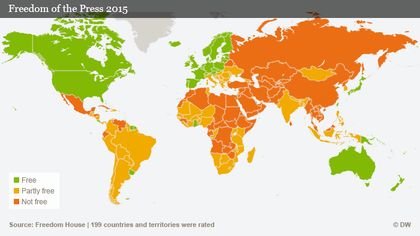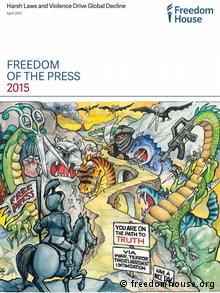Global press freedom is at its lowest rate in more than 10 years. Only one in seven people around the world live in countries with a free press.

According to the survey Freedom of the Press 2015 released by Freedom House, journalists around the world have encountered more restrictions from governments, militants, criminals, and media owners, and conditions for the media have deteriorated sharply in 2014 to reach their lowest point in more than 10 years
“Governments used security or antiterrorism laws as a pretext to silence critical voices, militant groups and criminal gangs used increasingly brazen tactics to intimidate journalists, and media owners attempted to manipulate news content to serve their political or business interests”, said Jennifer Dunham, project manager of the report.
KEY GLOBAL FINDINGS
Only one in seven - around 14 percent - of the world’s inhabitants live in countries with a free press. Of the 199 countries and territories assessed during 2014, a total of 63 (32 percent) were rated Free, 71 (36 percent) Partly Free, and 65 (32 percent) Not Free.
Although there have positive developments in some countries, the dominant global trend was negative. The number of countries with significant improvements (8) has been the lowest since 2009, while the number with significant declines (18) was the highest in 7 years.
 Of the 199 countries and territories, a total of 63 (32 percent) were rated Free
Of the 199 countries and territories, a total of 63 (32 percent) were rated Free
All regions except sub-Saharan Africa, whose average score improved slightly, have showed declines. Eurasia suffered the largest drop. By country, Thailand and Libya suffered the highest drip, along with South Sudan, Egypt, Greece, Hong Kong, Honduras, and South Africa.
The world’s 10 worst-rated countries and territories were North Korea, Uzbekistan, Turkmenistan, Eritrea, Crimea, Belarus, Cuba, Equatorial Guinea, Iran, and Syria. For the first time in this edition, the Russian-occupied territory of Crimea was assessed separately.
MORE FREEDOM IN EUROPE AND USA
Europe is the region that enjoyed the highest level of press freedom, with Norway and Sweden rated the world’s top-performing countries. However, regional average score has registered the world’s second-largest net decline over the past 10 years.
 Te survey has been published by Freedom House
Te survey has been published by Freedom House
One of the main reasons of this drop is Greece, which has fallen by 21 points on a 100-point scale (being 100 the worst and 0 the best) since 2010, due to “structural problems which were exacerbated by the economic crisis, and led to political pressures to the journalists”, explained Dunham.
The United States’ score fell by one point because of detentions, harassment, and rough treatment of journalists by police during protests in Ferguson, Missouri, but it is still the best region for freedom of speech after Europe.
MAIN FACTORS OF THE DECLINE
The report found that one of the main factors driving the decline was the passage and use of restrictive laws against the media: several countries in 2014 passed security or secrecy laws that established new limits on speech and reporting. In Egypt, for example, a court sentenced three Al-Jazeera journalists to seven or more years in prison on charges of conspiring with the outlawed Muslim Brotherhood to publish false news.
The other factor is the world’s growing number of areas that are effectively off limits for journalists, making very difficult for them to access and report freely from a given country, including protest sites and conflict areas
That includes parts of Syria and Iraq controlled by Islamic State extremists, states in northeastern Nigeria where Boko Haram is active, much of conflict-racked Libya, and Egypt’s restive Sinai Peninsula. In Mexico, Honduras, and other Central American countries, intimidation and violence against journalists continued to soar during the year.
“One of the most troubling developments of the past year was the struggle by democratic states to cope with an onslaught of propaganda from authoritarian regimes and militant groups,” Dunham said.
“There is a danger that instead of encouraging honest, objective journalism and freedom of information as the proper antidote, democracies will resort to censorship or propaganda of their own”, she added.
Freedom House is an independent watchdog organization that supports democratic change, monitors the status of freedom around the world, and advocates for democracy and human rights.

Las opiniones vertidas por nuestros colaboradores se realizan a nivel personal, pudiendo coincidir o no con la postura de la dirección de Protestante Digital.
Si quieres comentar o